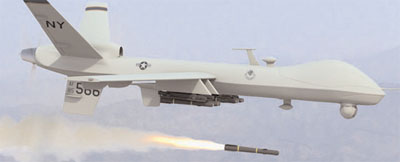America’s never-ending war on terrorism is almost always depicted in the mainstream media as a military and intelligence agency fight on a global battlefield. But it is also a propaganda war where the public is fed inaccuracies from Washington, especially when it comes to overseas killings by U.S. military drones. Here are five myths perpetuated by the military and its weapons makers that seek to make Americans feel good about drones and the White House’s policy of targeted assassinations.
Myth #1: They Target High Level Terrorists
Only two percent of drone strikes have killed “high value targets,” former counter-terror advisor to David Petraeus, David Kilcullen, notoriously remarked in a New York Times column early in the Obama presidency,where he said that 50 civilians were killed for every “high-value target” assassinated. That means that 98 percent of drone-caused deaths have been a mix of low-level militants, civilians, or another dubious Pentagon classification called “unknown militants.
” This spring McClatchy and later NBC reported that 25 percent of those killed in drone strikes in Pakistan have been classified as “unknown militants.” So by its own admission, the CIA has no idea whom they are killing about a quarter of the time. Keep in mind that if a militaryaged male is killed in a strike they are automatically presumed to be militants. The implication being, there is a huge room for error, and many of these “unknown militants” are likely civilians. In one case, the CIA classified 20-22 “unknown militants” killed. This strike actually killed around 40 civilians.
Myth#2: Drones Are Accurate
The Pentagon rhetoric touting “pin point” and “laser” accuracy of drones is baseless. Dr. Larry Lewis, a principal research scientist at the Center for Naval Analyses, a research group with close ties to the US military, studied the record in Afghanistan and found that drone strikes were no more accurate than traditional air power.
So, after all this talk about the ability to discern enemies through surveillance, they are no more accurate traditional fly-bys. This rhetoric has allowed us to kill innocent children. Notably, this study was done in Afghanistan,where there is ample ground and human intelligence for selecting and assessing targets, as well as people who investigate the aftermath of the strikes. But that is not the case in Pakistan and Yemen,which means that the strikes have been more deadly for civilians.
The implications from this reality are cynical and cavalier: Either the information on the ground is faulty, or drone operators are okay with certain levels of civilian casualties. Regardless, drones fall far short of the hyped rhetoric coming from the Obama administration.
Myth #3: Drone Targets Imminently Threaten America
The mainstream media have played into the CIA/Administration’s selective leaks about drones, especially the concept of a “kill list.” This military branding conjures up a process of carefully selected enemies who pose imminent threats to the U.S. However, the reality of “signature strikes” undercuts this P.R. construction.
Never officially acknowledged by the administration, signature strikes target unknown suspected militants who display “pattern of live” behavior associated with Al Qaeda and the Taliban. What the “patterns” consist of is officially a secret. What we do know is that as soon as signature strikes were implemented there was a spike in number of drone strikes and the number people killed in strikes. Furthermore, reporting has recently revealed that the original authorization for drone strikes in Pakistan came from now deposed President Musharraf.
The only way he would approve of the strikes was if the CIA killed his enemies. These “side-payments” became a characteristic of the CIA program. Instead of focusing on enemies of the U.S., the CIA played along with Pakistan’s intelligence agency, ISI, and its military to hit targets who posed no threat to the U.S.
Myth #4 Drones Are Cheap
Setting aside the moral, legal, and efficacy arguments about drones, the mantra from the administration, lobbyists and their lackeys in Congress has been drone’s low per-unit cost of $4 million to $5 million.
According to Winslow Wheeler of the Project on Government Oversight, “This is quite incorrect.” He states, “The actual cost for a Reaper unit is $120.8 million in 2012 dollars.” This is far above the $27.2 million dollar F-16C or the $18.8 million A-10. Seemingly, this “aura of inevitability” about investing in this new revolutionizing weapon is the militaryindustrial- complex at its self-serving worst.
Myth #5: Drones Are Making Americans Safer
They are not, in fact.Not only are drones effectible destabilizing a nuclear power, Pakistan, in one of the most conflict-ridden regions of the world, they are inciting waves of suicide bombers to attack Pakistan. They are also directly threatening the U.S. In a global age connectivity there is a new phenomenon of self- radicalization. People who identify with the Muslim Diaspora are seeing their kinsmen being murdered by America in a most brutal way.
The Boston Marathon bombers are only the latest example of this phenomenon. The most notorious selfradicalized terrorist was Faisal Shahzad, who, in 2010, tried to blow up New York’s Times-Square. When asked about his motive, he directly cited drones. These rebels with a cause will sadly become the norm as we push and provoke more of the world’s 1.3-1.4 billion Muslims into the political fringes where American violence begets more violence.
Last fall I traveled to Pakistan where I witnessed first-hand the horror and challenges people of Pakistan face while living under drones. I went to Pakistan to investigate the civilian casualties caused by U.S. drone strikes and to speak with Pakistani people about how drone strikes impact their families, their communities, and their lives.
During my travels I met Rafiq ur Rehman and his son and two young daughters whose mother was killed in a drone strike. Rafiq’s daughters reminded me of my daughters at a very young age and speaking with them left a significant impression on me. It helped drive my desire to create our upcoming film on drones.
